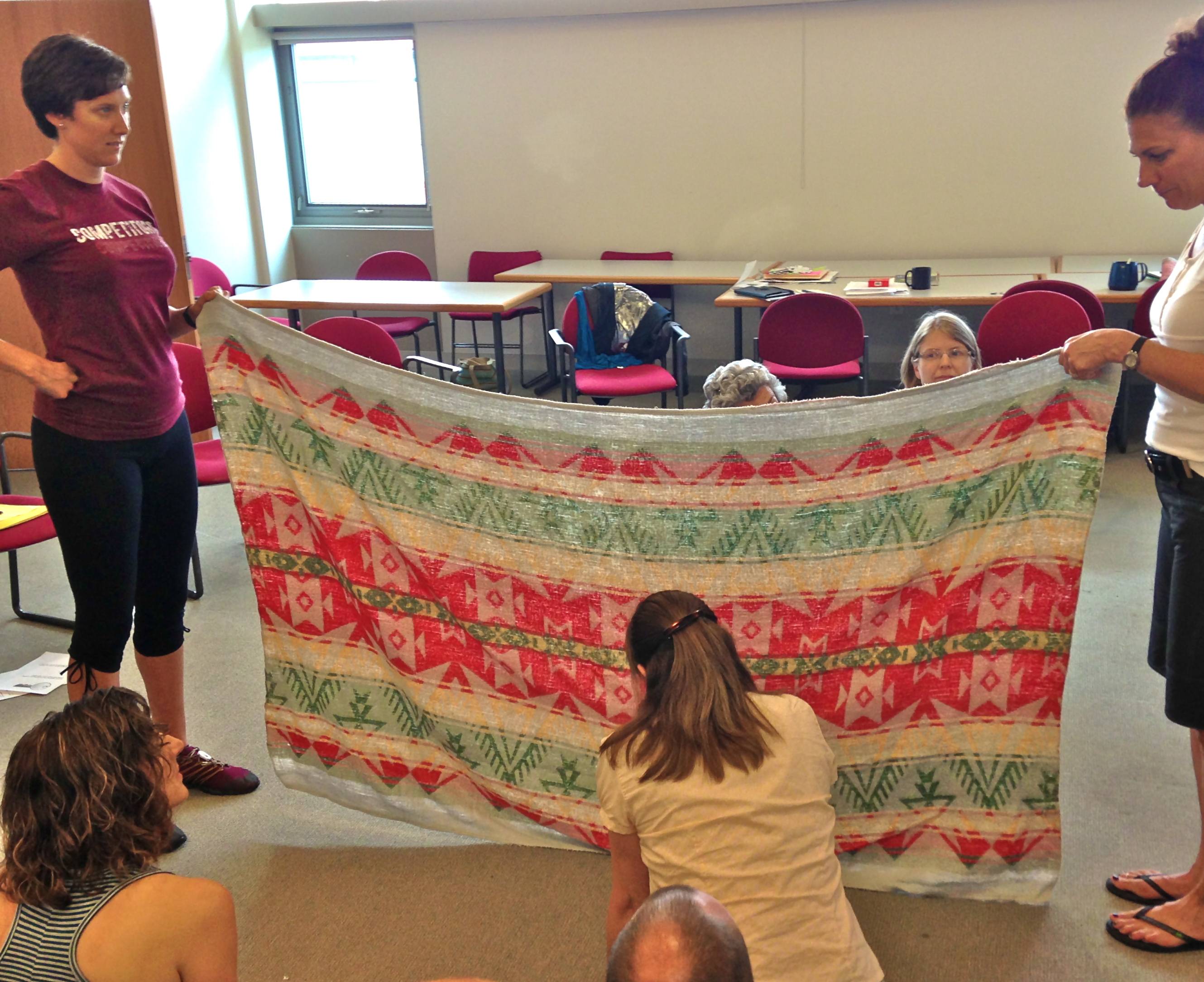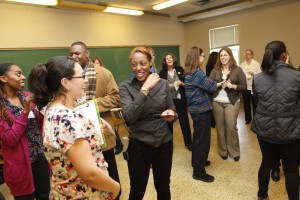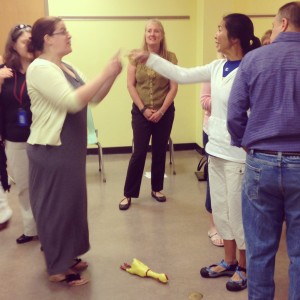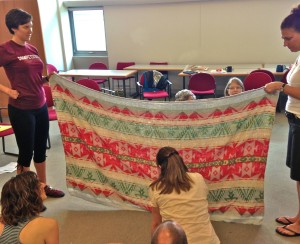
Sep 02, 2013 The Importance of Names
During this “back to school” and fall program kick off time of year educators engage groups in introductory activities, ice-breakers and get to know you activities. Regardless of the types of groups you work with it is useful to have a repertoire of simple and palatable name activities.
 Knowing and using each other’s names in a respectful way builds trust and positive communication establishing a supportive group environment. Activities that clarify names can be helpful even to groups that you might think already know each other. A person’s name is very important to them and should be honored with correct pronunciation and proper use.
Knowing and using each other’s names in a respectful way builds trust and positive communication establishing a supportive group environment. Activities that clarify names can be helpful even to groups that you might think already know each other. A person’s name is very important to them and should be honored with correct pronunciation and proper use.
Presenting a series of activities that help participants use and practice names can be very helpful to establishing a strong foundation of trust and understanding. I like to weave name activities and practice into introductory activities in a “natural” way starting with simple partner greetings and sharing before engaging participants in a whole group name activity. I try to avoid contrived name activities that put people in the “on the spot” too early, or require them to feel under pressure to memorize. The following are my tried and true activities to help groups learn, practice and reinforce names in a meaningful, but playful non-threatening and palatable way.
Name Meanings Activity
When people have meaningful information to associate with a person’s name it will help them make a stronger connection and better remember their name. In classroom settings and workplaces where participants already know each others names this activity helps them learn more about each other, and can lead to discussion around the importance of honoring a person’s name i.e. pronouncing it correctly and using it appropriately and showing respect for each other in the classroom. This activity works best after a few warm up activities like the handshake mingle so the group is more comfortable with and willing to share.
Directions:
- Simply ask the group to line up silently by the number of letters in their name, or preferred nickname.
- Once the group is successful, have them go around and share their name.
- Ask them to clarify the correct pronunciation or nickname, and share anything they would like about “the story of their name” (i.e., what they know about its origin or meaning, whether it is a family name).
- Emphasize that they don’t have to share a story if they don’t have one to share.
- Most importantly this is an opportunity for participants/students to take ownership and share with the group the CORRECT pronunciation or nickname. Something that often gets overlooked or mistaken in school settings.
Outcomes/ Reflection: This activity is a particular favorite because groups find it interesting and fun and an alternative to some “contrived” name games. It helps students connect, learn more about each other, and make associations that help them remember other group members’ names. It even works with large classroom groups. Participants seem to want to listen and share about this kind of “personal” information. It is especially effective after a few warm up activities like the handshake mingle.
I have found that even very young children know about their name origin and or feel strongly about what they want to be called. Time and time again in my groups this has become an opportunity for students to correct a mispronunciation or unwanted nickname that their fellow students and teachers have incorrectly been using for months. People of all ages have shared they prefer this activity to other name games because they get to share information that is factual and they don’t have to think of contrived additional information i.e. “a favorite fruit that begins with the same letter as their name.” as some name games require. The sharing aspect of this activity helps students become comfortable with “seminar style” sharing in their classroom.
Reference: I learned this activity from a group of teachers in Laconia, NH. It is also written up in Tips & Tools for the Art of Experiential Group Facilitation
Name Roulette
This is an active and playful group memory game that motivates participants to quickly check in and make sure they know each other’s names.
Directions:
- Divide participants into two groups and have them form side-by-side circles.
- Place an object between the two circles that acts as a marker.
- Have both circles of participants shuffle left or right while facing the center of their circles—no looking over shoulders.
- When you say stop, the two participants who are at the marker have to turn around and name the person they are now facing.
- Whoever names the other person first captures that person onto their team, and the captive must join that circle.
The value in this activity is that when presented with the challenge, participants will study up on each other’s names. Give teams a few minutes at the start of the game for participants to check in with each other and review names together – friendly competition is a great motivator!
Reference: I learned this kinesthetic activity from Karl Rohnke. It is also written up in Tips & Tools the Art of Experiential Group Facilitation. 2007. Jennifer Stanchfield, Wood N Barnes Publishing Company
“Peek a Who “ Names or Appreciations Activity
Another favorite, often called “Peek a Who” (Rohnke, 1991), is similar to name roulette but adds the intrigue of hiding behind a blanket. People of all ages love this game. Originally I used this activity primarily with elementary students, but I’m finding that both adults and adolescents also enjoy the playful, hiding aspect of the game. As brain research is showing people of all ages like to hide, play, guess and predict.
Directions:
- Divide group into two teams using the partner dividing activity (see_post).
- Have two facilitators or group members hold up a large blanket or tarp.
- Ask the teams to stand on opposite sides of the blanket, hidden from the view of the other team. Each team then chooses one person to move up close to the blanket (for young students this can be one of the most important aspects of the game- taking turns).
- On the count of three, the blanket drops and the two participants race to name each other. The winner captures the other person onto their team.
- As with Name Roulette when presented with the challenge, participants will study up on each other’s names. Give teams a few minutes at the start to review the other team’s names together.
In Tips & Tools: The Art of Experiential Group Facilitation I offer a “complements” version of this activity for building positive group norms, practicing positive descriptive language, practicing reflection and celebrating group members strengths.
Reference: Peek a Who activity originally comes from the New Games Foundation and later appears in Quicksilver and other Karl Rohnke books Complements Version: Tips & Tools: The Art of Experiential Group Facilitation. Jennifer Stanchfield, Wood ‘N’ Barnes Publishing 2007.
Hopefully these activities will help you start fall programs and classes off with style. Remember that a key ingredient for creating a positive environment is to help group members know and use each other’s names correctly from the very beginning of the school year or program. Even in small school districts where educators might assume students already know each others’ names, many actually don’t, or are not always using and honoring each others’ names in a respectful way. Name activities can help groups of all ages not only learn and practice names but explore the concepts of connecting with others, honoring individual strengths and personalities, and showing respect for their individualism their identity and their choice.





Sai Gollapudi
Posted at 01:46h, 30 NovemberAn interesting cultural take on the “peek a who” activity… In india, this blanket / veil concept is used during traditional (south) Indian weddings. As you may have heard, India is into arranged marriages. Per our culture the bride and groom have best chances of success in their marraige if they see each other just at that perfect moment. This perfect moment is predicted by experts based on each other’s astrological charts. I think they call it Lagnam (in South India).
SaiGo